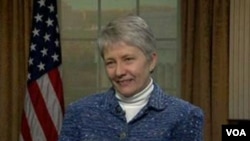"Empowering women across the globe is not simply the right thing to do," said U.S. President Barack Obama, "It is also smart foreign policy."
One important part of that empowerment, is increasing women and girls' access to technology and participation in science.
Assistant Secretary of State Dr. Kerri-Ann Jones, a scientist herself, recently travelled to Qatar, Egypt, Kazakhstan, Uzbekistan, and Kenya to help promote this policy objective:
"Looking at science and technology we need to engage everyone. We can't leave women and girls out. It's not fair to them and it's not fair to the world."
The Obama administration is working to achieve these goals on many levels. One the ground, one way to get women and girls engaged is to give them technology that many people take for granted:
"One important initiative is called mWomen. And that really looks at the fact that in a lot of places women are not the ones getting cell phones. There's a difference between how many men, versus how many women … certainly nowadays, they're a part of running businesses, they're a part of what's going on in the world. They are a very empowering technology."
mWomen aims to give close to 150 million women access to mobile technologies in poor countries in order to help close this gender gap.
Another example of outreach, said Dr. Jones, is the U.S. State Department's African Women in Agricultural Research and Development (AWARD). This program helps train women who are already scientists in management, leadership skills and entrepreneurship.
The Bureau of Oceans and International Environmental and Scientific Affairs that Dr. Jones oversees has many bilateral science and technology agreements with countries around the world. Through these agreements we can increase education and career opportunities for women and youth in science, technology and innovation.
"In many of those, we hope to really emphasize the participation of women and girls in science so that we can partner our community with scientific communities around the world and make sure that we are really training the next generation of scientists – boys and girls."




